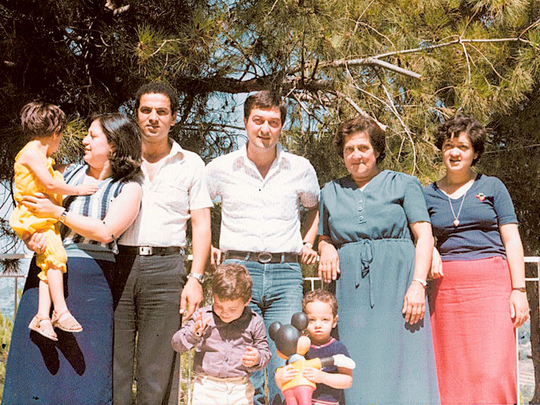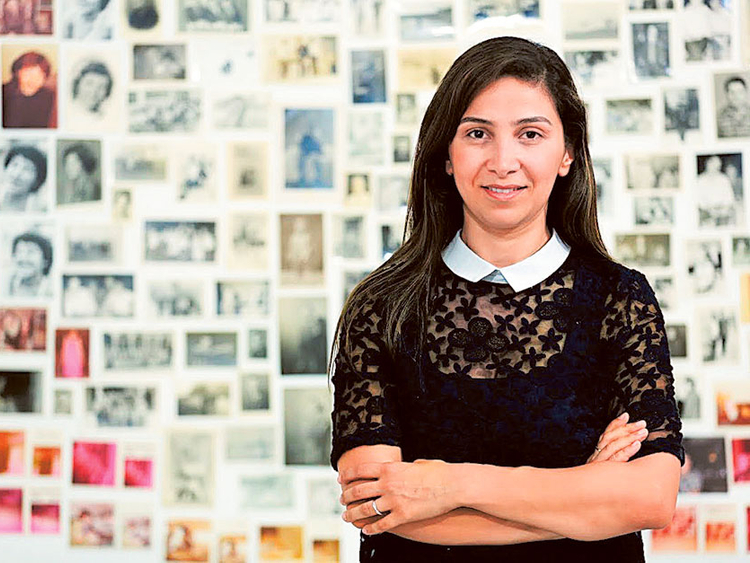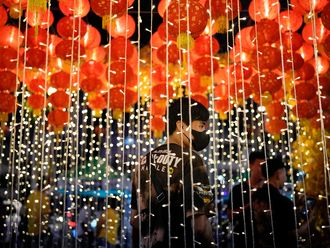
A budding filmmaker, a successful crowdfunding campaign and a tragic family mystery — combine these elements and you have the makings of an intriguing documentary that is sure to keep audiences fascinated until the final credits.
But “Rasheed the Film” is not just a documentary for its director, Samia Badih, an Abu Dhabi-based journalist and media consultant. It is a personal journey to uncover what happened to her uncle, Rasheed Broum, during the Lebanese civil war, which began in 1975 and ended in 1990.
“My uncle was killed in an airstrike in Saida, Lebanon, during the 1982 Israeli invasion. Growing up, I did not know anything about Rasheed, and was always curious to know what happened to him and his family. But it was not until I became a journalist that I started thinking seriously about pursuing the story. So I decided to set out on the journey of trying to piece his life together,” Badih said.
“While making the film, I learnt a lot about him — most significantly that he was a social and political activist who stood up for what he believed in. Now I understand why his name still resonates with many people in Saida today. The film also shows the magnitude and impact of war on the thousands of Lebanese families who lost their loved ones.”
However, Badih admitted that due to the sensitive nature of her film, she received mixed reactions from her family and those who knew Rasheed when she approached them to be part of the documentary.
“Some were happy to speak to me about him; others were hesitant. I understand why that was so. Rasheed’s death and the tragedy of war had left deep wounds in their lives. Talking about Rasheed and the lead-up to the war meant opening and facing those wounds again after many years. But during the interviews I was able to learn more about Rasheed as a person, such as his love for his wife Souad, and how they fought for their love, which was quite inspiring.”
While shooting the film, one of the biggest challenges Badih faced was interviewing family members, as some hadn’t spoken about Rasheed for a very long time. “It was particularly difficult to interview my mother. She never spoke of him, or of what happened to him. It was difficult to see her hurt and still remain the interviewer and filmmaker. I am hoping the film would bring some kind of closure.”
Badih also had to contend with filming the documentary’s footage in various locations. While most of the shooting took place in Saida, her hometown, Badih also had to arrange for several interviews in the UAE as well as one in America. “The only logistical challenge was finding the right crew when I was filming outside Lebanon, but I have been lucky to work with great freelance videographers.”
Another element that Badih had to address was how to best bring her uncle to life on the screen. “It was challenging as there is no footage or voice recording of Rasheed. Instead, I had to dig hard into the stories, the little anecdotes, the details, to get a sense of who he really was.”
In addition to interviews, Badih sifted through countless family photographs and albums to find anything that could be used in the documentary. “I relied heavily on family photos, even though taking photos during that period [1950s-80s] was not as common or accessible as it is today. [I even found some] footage of my uncle, [which] was a wonderful surprise. He was dancing with his wife at a party. I found the tape towards the end of production. At that point, I felt that I knew Rasheed, [so] the footage was a great gift.”
Badih was also keen to give the film a slightly broader context of life in Lebanon during that period, so she reached out to major news organisations to acquire anything that could be incorporated into her film. “For news footage and archived material, I reached out to the Associated Press, which has a very rich library on Lebanon of the 1970s and 1980s.”
The filmmaker also had a rare opportunity to get a deeper insight into what happened during the civil war when Robert Fisk, the award-winning Middle East correspondent for “The Independent”, shared his memories and experiences. “It was great getting to meet Fisk and talk to him about what he saw and reported on back in 1982. I had been trying to get in touch with him for a while when a friend informed me that Fisk was in Abu Dhabi and gave me his number. I called Fisk and he was willing to meet me. It was accidental, but he agreed to speak on camera. I am very happy that he did.”
The meeting turned out to be invaluable for Badih, as Fisk not only provided her with first-hand accounts of that period, but also sage reflections. “The interview was very insightful. He told me something I will never forget. He said, ‘When you give a dead person a name, they live again.’ That is exactly the case with Rasheed.”
“Rasheed the Film” is now in the final post-production stages and is expected to be completed soon and Badih, needless to say, is quite excited. Though she would have loved to keep as much footage as possible, there was some material that simply couldn’t be featured. “I had to cut out several great interviews simply because they made parts of the film redundant, or because the stories were too similar. All the interviews, however, were instrumental in the storytelling, even those not used directly.”
Some interviews struck a deep chord as they were being conducted, chiefly because they brought back mixed memories and unearthed painful emotions for some. “The closest to my heart is my mother’s interview. It was extremely difficult for me to see her still hurting.”
Even as the strands of the film were coming together, Badih was all too aware of the uncertainties that documentary filmmaking has, as opposed to other genres. Along with searching for footage and conducting interviews, everyone involved had to make sure that the finished film would be compelling for audiences of all ages and backgrounds.
“By nature, a documentary is very organic. Regardless of how much you plan it, you never know what to expect — whether the interviewees are going to be good storytellers, if they are going to add value to the narrative or if the visuals are going to be interesting ... so there was always this worry about being able to capture the moments that could help tell a story that took place more than 30 years ago.”
Once Badih is satisfied that Rasheed’s story has been told in the best way possible, she plans to organise a series of screenings, both for those who had contributed to her crowdfunding campaign as well as for her family, Rasheed’s friends and the community in her hometown.
“I am planning [to host] a special screening for the supporters of and contributors to the film, in addition to organising a screening in Saida, where Rasheed was also from. I would love to have his story told there first, as the film is a tribute to him and the people who were killed during the war in Lebanon.”
Once all this is done, she has ambitious plans, starting with having “Rasheed the Film” screened at as many locations and film festivals as possible. “I would love to see it being screened in my home country Lebanon as well as at the Dubai International Film Festival, since I am based in the UAEand where all this hard work is being done. Also on my wish list is the Toronto International Film Festival.
“My main goal is to have as many people watch the film as possible. I want people to see it and hear the story of my uncle. But more importantly, I want them to learn about the tremendous impact of war on the lives of the ones who survived.”
However, telling Rasheed’s story would have been much harder had the film not received the support it did. Badih launched a crowdfunding and awareness campaign last year on Zoomal, a leading crowdfunding platform tailored especially for creative projects from the Middle East. “To pitch [it], I created a three-minute YouTube video ... [and managed to raise] $12,000 [Dh44,075]. I am so grateful to the people who supported the campaign and the film, including family, friends, colleagues and others who believed in the project. Were it not for their support, I would not have been [able] to quickly move forward with the film’s production.”
Badih decided to take the risk, knowing that not all crowdfunding campaigns successfully meet their target within the deadline. “Crowdfunding was a great solution because it helped me kill two birds with one stone: get the funds and mobilise a fan base, hence creating awareness and building momentum for the film. [Also, it] presented the possibility of raising money that I did not have. I did not invest any money to launch the campaign so there was no harm in doing it.”
Badih noted that while funding remains a challenge for filmmakers in the region, it has not discouraged creativity in the Arab world. That is evidenced by the films being screened in the Middle East and around the world at various festivals.
“The film industry in the Arab world has taken great strides in the past few years. This has been rather inspirational for me as a filmmaker. In the past few years, we have seen great films by internationally acclaimed filmmakers such as Nadine Labaki and Hany Abu-Assad. Most recently, Lebanese director Ely Dagher picked up the Palme d’Or at Cannes for his short animated film, ‘Waves ’98’,” she said.
“The region has also become home to many institutions, such as Sanad by twofour54, the Dubai International Film Festival and Screen Institute Beirut, that support young Arab filmmakers. Having said that, funding remains a challenge, which is why crowdfunding is a great potential solution.”
Even as the documentary filmmaker is excited to share the story of her family, she acknowledges that all that has been achieved to date would not have been possible without a strong support system, which allowed her to balance her personal and professional lives. “I am a mother of two boys. It has been tough juggling an ambitious film project such as “Rasheed” with motherhood, but I am so lucky to have a supporting husband and family. I also have a great crew that understands my crazy work schedule.”
Qoutes
“For me, and for many others, Rasheed was a role model of integrity, responsibility and principles. I learned these from him. The film opened an old wound ... it also allowed for closure and healing, not only at the personal level but at the larger human level as well.” -Maha Broum, Rasheed’s sister and Samia Badih’s aunt
“I was with my mother when she found out that Rasheed was killed. I still remember that scene as if it was yesterday. I was five then and no one talked to me about it. Working on ‘Rasheed’ has been therapeutic. The story is heartbreaking, no matter what angle you take. Learning about my uncle, though, has provided some relief.” -Lina Badih Duque, Samia Badih’s sister and Rasheed’s niece
Nathalie Farah is a writer based in Abu Dhabi.
To learn more about “Rasheed the Film”, visit www.facebook.com/rasheedthefilm.













